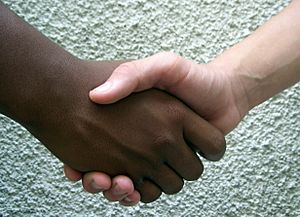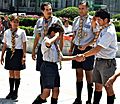Handshake facts for kids
A handshake is a special way two people greet each other or show they agree on something. It's when you hold someone's hand for a moment and gently move them up and down. It's like saying "hello," "goodbye," or "it's a deal!" without using words. Handshakes are used all over the world in many different situations.
Some secret groups have secret handshakes. These are special ways to shake hands that only members of the group know. It helps them recognize each other and show they belong.
Contents
Why Do We Shake Hands?
People shake hands for many reasons. It is a common way to show respect and trust. When you shake someone's hand, you are showing that you are friendly. It can also be a sign of peace.
Greeting and Farewell
The most common reason for a handshake is to say hello or goodbye. When you meet someone new, a handshake is a polite way to introduce yourself. It is also used when you are leaving a meeting or saying farewell to a friend.
Showing Agreement
Handshakes are often used to seal a deal or agreement. If two people agree on something, they might shake hands to show their promise. This makes the agreement feel more official. It shows both people are committed to what they have decided.
Celebrating Success
After a sports game or competition, players often shake hands. This shows good sportsmanship and respect for their opponents. It is a way to congratulate each other, no matter who won.
A Brief History of Handshakes
Handshakes have been around for thousands of years. People in ancient times used them too.
Ancient Times
One of the oldest examples of a handshake is from ancient Mesopotamia. An image from the 9th century BCE shows two kings shaking hands. This likely meant they were making a peace treaty or an important agreement. The handshake showed they trusted each other.
Ancient Romans also used handshakes. They often showed handshakes on their coins. These images sometimes featured the goddess Concordia, who represented agreement and harmony. For Romans, a handshake could mean loyalty or friendship.
Medieval Period
During the Middle Ages, knights and warriors would shake hands. This was a way to show they were not holding a weapon. It proved they came in peace and had no hidden daggers. This helped build trust between people meeting for the first time.
Modern Handshakes
Over time, the handshake became a common social custom. It spread across many cultures and countries. Today, it is a widely accepted way to greet people in business, politics, and daily life.
How to Give a Good Handshake
Giving a good handshake is important. It can make a good first impression.
Firm but Gentle
A good handshake should be firm, but not too strong. You don't want to squeeze someone's hand too hard. A gentle grip shows confidence and respect.
Eye Contact
When you shake hands, it's good to look the person in the eye. This shows you are paying attention and are sincere. It helps you connect with the other person.
One or Two Shakes
Usually, a handshake involves one or two gentle up-and-down movements. Then you let go. It should not last too long. A quick, polite shake is usually best.
Different Handshake Styles
While the basic handshake is common, there are some variations.
Left-Handed Handshakes
In some groups, like the Boy Scouts, a left-handed handshake is used. This is a special sign of friendship and trust. It comes from a story about two African tribes who showed trust by shaking with their shield hand.
Cultural Differences
The way people shake hands can be different in various cultures. In some places, a very light touch is preferred. In others, a firmer grip is normal. It is always good to be aware of local customs.
Related pages
Images for kids
-
Assyrian king Shalmaneser III (right) shakes the hand of Babylonian king Marduk-zakir-shumi I (left), 9th century BCE
-
Leaders welcome a boy into Scouting, March 2010, Mexico City, Mexico. Note the left-handed handshake.
-
Israeli Prime Minister Yitzhak Rabin, U.S. President Bill Clinton, and Yasser Arafat at the Oslo Accords signing ceremony on 13 September 1993
-
Antiochus I Theos of Commagene, shaking hands with Heracles 70–38 BC, Arsameia.
See also
 In Spanish: Apretón de manos para niños
In Spanish: Apretón de manos para niños
 | Claudette Colvin |
 | Myrlie Evers-Williams |
 | Alberta Odell Jones |














